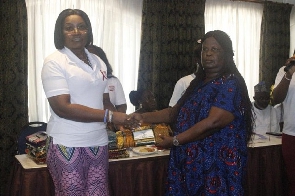The Oncology Department of the Korle Bu Teaching Hospital (KBTH) is partnering with the Meena Breast Cancer Awareness Project to propose a new approach to breast cancer advocacy in the country. The new approach is tailored to the younger population, which is concentrated in the various High Schools and Universities, and targeting this niche group holds many advantages with a relatively younger population affected by breast cancer. Ms. Abigail Olympio, a Resident Oncology Nurse at Korle Bu Teaching Hospital, made this known during the launch of the Meena Breast Cancer Awareness Project in Accra. The project was launched in honour of the late Mrs. Amina Oppong-Kwarteng, the wife of Mr. Ibrahim Oppong Kwarteng, the Executive Director of Crime Check Foundation. The awareness campaign is in fulfilling the vision of his wife to reach out to many women in the remotest parts of the country, cities, and prisons to offer them screening opportunities and to support them financially to go through painful treatment procedures. Ms Olympio said, “Our aim is to intervene early in life to reduce the incidence of late presentation.” She said it was aimed at building a lifelong culture of breast self-examination and general self-care in the younger populace. “While breast self-examination may not hold an immediate benefit in this age group, a lifelong habit of attentiveness to the breast will in the future prove worthy of this investment,” she said. Ms. Olympio said young people when stimulated could themselves be advocates in their homes and communities and would help demystify the myths and misconceptions that surround breast cancer and its management. She urged stakeholders to take advantage of the strong, proactive, dynamic, and energetic young adults to champion awareness creation. In the year 2020, about 4000 new cases were diagnosed in Ghana and about 70 percent of this number was reported rather late and in an advanced stage. She said Breast Cancer awareness interventions were found to increase the uptake of breast self-examination behaviour and increase participation in screening activities. She said it also created awareness of the risk factors for the condition. Mr. Kwarteng said the announcement of his wife’s death was something he had not gotten over and before her demise, she wanted to champion awareness of Breast Cancer. “She fought the disease, unfortunately, she is not here with us but her dream to create awareness is still alive, hence the birth of Project,” he added. He said just us women were encouraged to use hygienic sanity products every month, Breast Cancer awareness should be an everyday thing. “Constant self-examination and periodic hospital visitation must be a part of our daily lives,” he added. He said the yearly advocacy on the disease seems not to yield the needed result as many women become aware of themselves only during the breast cancer awareness month of October. “The disease breaks families apart. The cost of treatment involved is huge and the chance of survival of a patient is narrow, so we want to fight breast cancer every day and not only in October. The yearly advocacy is not sustainable,” he said. Mr. Kwarteng said apart from the advocacy, breast cancer patients would also be supported financially to undergo treatment under the project. The Executive Director said the project would be run alongside the Foundation’s Health Check Series to support patients undergoing treatment. “We cannot win this war alone, so we will need the support of the public to be able to carry out the campaign effectively,” he said. Dr. Florence Dedey, Head of Breast Cancer at KBTH, said the Project was a much-needed initiative considering the state of breast cancer in Ghana as of now. She said with an estimated 4000 people affected by the disease mostly women, unfortunately, the country loses about 2000 people each year to the disease. “The statistics show us that more people in our part of the world succumb to the disease as compared to others elsewhere,” she said. Dr. Dedey said it was a well-established fact that the early detection of breast cancer and effective treatment resulted in good outcomes and saved lives but unfortunately, ‘we lose many of our women to the disease because the diagnosis is either made too late or treatment is started late or at times not completed due to several reasons.’

















